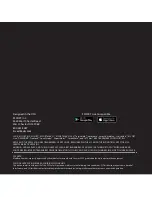
PRIMUS
R
660 Digital Weather Radar System
A28–1146–111
REV 2
Index
Index–6
Index (cont)
System configurations, 2-1
dual configuration, 2-1
dual control mode truth table, 2-3
equipment list, 2-4
cockpit mounted options, 2-4
remote mounted, 2-4
stand–alone, 2-1
T
Test mode, 4-6
color bands, 4-6
dedicated radar indicator, 4-6
EFIS/MFD/ND, 4-6
Test mode with TEXT FAULTS
enabled, 8-2
Thunderstorms, A–3
Cancellation, A–3
general, A–3
hazards, A–4
do’s and don’ts of
thunderstorm flying, A–8
effect on altimeters, A–7
hail, A–6
icing, A–5
lightning, A–7
low ceiling and visibility, A–7
schematic cross section of a
thunderstorm, A–6
squall lines, A–4
tornadoes, A–4
turbulence, A–5
weather radar, A–7
national severe storms laboratory
(NSSL) thunderstorm research,
A–10
extrapolation to different
climbs, A–13
hail in thunderstorms, A–12
maximum storm tops, A–12
modification of criteria when
severe storms and rapid
development are evident,
A–13
relationship between
turbulence and altitude,
A–10
relationship between
turbulence and reflectivity,
A–10
turbulence above storm tops,
A–11
turbulence and echo intensity
on NWS radar (WSR–57),
A–11
turbulence below cloud base,
A–12
turbulence in relation to
distance from the storm
edge, A–11
turbulence in relation to
distance from storm core,
A–11
use of airborne radar, A–13
visual appearance of storm
and associated turbulence
with them, A–12
purpose, A–3
related reading material, A–3
Tilt management, 5-5
tilt setting for minimal ground
target display, 5-8
12–inch radiator, 5-8
18–inch radiator, 5-9
Tornadoes, A–4
Trim adjustments, 7-1
Turbulence
above storm tops, A–11
and echo intensity on NWS radar
(WSR–57), A–11
below cloud base, A–12
in relation to distance from storm
core, A–11
in relation to distance from the
storm edge, A–11
relationship between turbulence
and altitude, A–10
relationship between turbulence
and reflectivity, A–10
Summary of Contents for PRIMUS 660
Page 1: ...AD 54257 ...



































